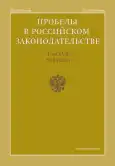Problems of Implementing the Principle of Subjective Imputation in Criminal Law
- Authors: Gadzhieva A.A.1
-
Affiliations:
- Dagestan State University of National Economy
- Issue: Vol 17, No 3 (2024)
- Pages: 152-157
- Section: Criminal Law Sciences
- URL: https://journals.eco-vector.com/2072-3164/article/view/634223
- EDN: https://elibrary.ru/KJKRJS
- ID: 634223
Cite item
Abstract
The purpose of the study. The given article examines the concept of «subjective imputation» in Russian criminal law and identifies problems which arise in the process of legal qualification. This leads to the necessity of developing the author's understanding of the concept and essence of subjective imputation.
Conclusions. Based on current legislation, the author of the article points out that the subjective imputation is a principle of criminal law that should not be violated in judicial practice. With this understanding the author does not pretend to cover all aspects of the chosen topic for research, but rather focuses on specific issues related to violations of the principle. In this regard, the study emphasizes the importance of implementing the principle of subjective imputation in the qualification of continued crimes, it is also noted that there is inconsistency in the explanations of the Plenum of the Supreme Court of the Russian Federation which regard to the different types of crimes. Therefore, it is suggested that the rules for qualifying ongoing crimes should be unified accordingly to the principle of subjective imputation rather than being ruled by the actual circumstances of the case, which are often the result of objective imputation. Explanations regarding to the value of stolen property are inconsistent with the principle of subjective imputation when it is substituted by a lesser value fraud mechanism. In conclusion, it is elicited that a deviation from the principle of subjective imputation through legal judicial interpretation creates a threat to the rights and legitimate interests of individuals, violating their rights and undermining legality and order in society. This can lead to arbitrary interpretation of the criminal law, which can sometimes be applied differently in various cases.
Full Text
About the authors
Aisha A. Gadzhieva
Dagestan State University of National Economy
Author for correspondence.
Email: aisans@mail.ru
SPIN-code: 9936-7377
Cand.Sci.(Law), Associate professor, associate professor of the Crimila law and State law Disciplines Department
Russian Federation, MakhachkalaReferences
- Alekseev, A. G. The statement and overcoming of objective imputation in Russian law [Text] / A. G. Alekseev // Eurasian Law Journal. – 2019. – № 1(128). – Pp. 258-259.
- Donskaya, O. G. Subjective imputation in the criminal law of Russia / O. G. Donskaya, A. A. Sashenko // Scientific notes of the V.I. VernadskyCrimean Federal University. Legal sciences. - 2022. – Vol. 8, No. 1. – pp. 125-131.
- Kovalev M.I. The right to life and the right to death [Text] /I.M. Kovalev //State and law. 1992, No. 7. pp. 69-70.
- Lopashenko N.A. Crimes against property. The author's course. In 4 books of Book II. The general theory of theft. Types of theft: Monograph. M.: Yurlitinform, 2019. p. 90.
- Morozova, A. A. About the question of the ratio of objective and subjective imputation through mediation in commercial corruption / A. A. Morozova, V. I. Dineka // Bulletin of the Academy of Law and Management. – 2021. – № 4(65). – Pp. 54-59.
- Nazarenko, G. V. Substantive and legislative-technical aspects of the principle of subjective imputation (guilt) in the criminal law of Russia / G. V. Nazarenko // Legal science and practice: Bulletin of the Nizhny Novgorod Academy of the Ministry of Internal Affairs of Russia. – 2020. – № 2(50). – Pp. 97-104.
- Naumov A.V. The implementation of criminal law and the activities of the investigator. Textbook / Naumov A.V. - Volgograd: Publishing House of the Supreme School of the Ministry of Internal Affairs of the USSR, 1983.
Supplementary files











